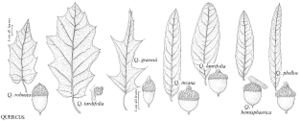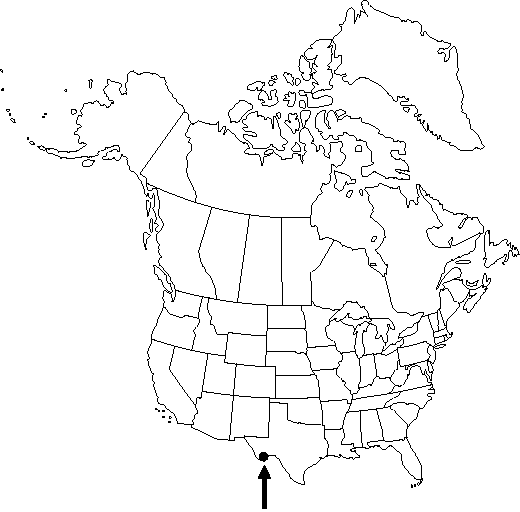Quercus robusta
Torreya 34: 119. 1934.
Trees, deciduous, to 13 m. Bark brown or black, roughly furrowed. Twigs dark reddish-brown, 1.5-2.5 mm diam., densely pubescent or glabrate. Terminal buds glossy light-brown, acutely ovoid, 4-7 mm, glabrous or pubescent on apical 1/2. Leaves: petiole 5-20 mm, pubescent or glabrate. Leaf-blade acutely ovate to elliptic, widest at or proximal to middle, 55-120 × 20-50 mm, base cuneate to rounded or subcordate, margins with 6-8 teeth or shallow lobes with rounded sinuses, rarely entire, 1-10 awns, apex acute or attenuate; surfaces abaxially glabrous except for small axillary tufts of tomentum or pubescent along midrib, adaxially glabrous or persistently pubescent near base and along midrib. Acorns biennial; cup deeply cupshaped, 6-9 mm high × 8-12 mm wide, covering 1/4-1/3 nut, outer surface puberulent or glabrate, inner surface uniformly pubescent, scales tightly appressed, acute or attenuate; nut oblong to broadly ellipsoid, 10-22 × 7-10 mm, glabrate, scar diam. 3.5-4.5 mm.
Phenology: Flowering spring.
Habitat: Moist wooded canyons in Chisos Mountains
Elevation: 1500 m
Discussion
Of conservation concern.
After describing this species, C. H. Muller later (1951, 1970) concluded that it represented a hybrid between Quercus emoryi and Q. gravesii. The extreme forms (e.g., the type specimens) of Q. robusta and Q. gravesii are easily differentiated, but these two taxa appear to occupy the ends of a morphologic continuum. Muller's recent view, however, is that Q. robusta deserves species status. The origin of this taxon is still worthy of study.
Selected References
None.

